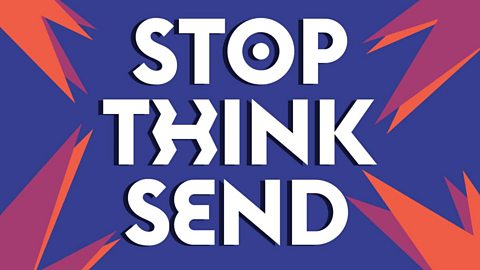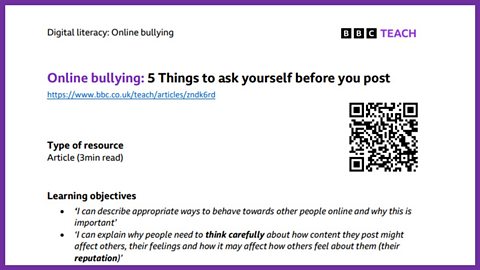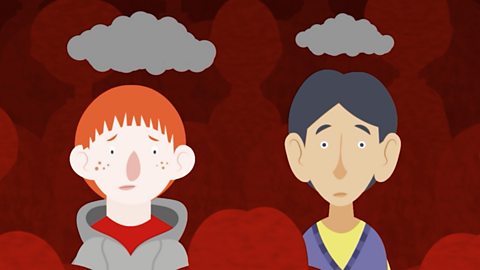Article summary
This article looks at five things to ask and think about before posting something that might be a problem on social media.
Things to consider before you post online
While we may not mean to be mean, itÔÇÖs always good to STOP, THINK and ask yourself these questions before pressing SEND.

Am I jealous?
ItÔÇÖs easy to feel jealous towards others. Many people often post only the fun highlights of their lives.
When we only see the good stuff our friends are doing, we can start to feel a bit resentful and this can show in our comments.
Before you react with a comment, ask yourself: Am I being jealous and do I really need to send it?
Is it helpful?
You might want to comment to tell someone how they can make their content even better - like asking your favourite YouTuber to make longer videos because you want to see more!
But there's a fine line, between a helpful and a hurtful comment.
Before hitting send check that what youÔÇÖve written is encouraging and helpful, rather than unkind and negative.
Are you following the crowd?
Peer pressure is when you do something because you want to fit in. This can happen IRL at school but also online in the comments section.
It can be very tempting to post something not very nice on a page because everyone else in your class has.
Before commenting and before reading any other comments, ask yourself how you really feel.
Would I say that to their face?
When posting online it can be very easy to say things we wouldnÔÇÖt normally, because we are not talking to a person face-to-face.
Remember there are real people on the other side of the screen.
What you comment or message can be just as hurtful as saying it IRL.
Before posting, try asking yourself: would I say that to someoneÔÇÖs face? And: how would I feel if someone said that to me?
Why am I posting this?
If you donÔÇÖt have anything nice to post, donÔÇÖt post!
If youÔÇÖre not sharing the love, sharing the laughter, or sharing your news, then maybe you shouldnÔÇÖt comment.
Before you hit send: What's the point of your post?
Article: 3 min read
Learning objectives
(from the set out by the UK Council for Internet Safety)
- _I can describe appropriate ways to behave towards other people online and why this is importantÔÇÖ
-_I can explain why people need to think carefully about how content they post might affect others, their feelings and how it may affect how others feel about them (theirreputation)ÔÇÖ
Glossary
- Jealous: the feeling of envy, usually supported by insecurity, fear, or wanting somethingthat someone else has
- IRL: acronym for ÔÇśIn Real LifeÔÇÖ
- Resentful: feelings of bitterness after feeling youÔÇÖve been treated unfairly
- React: to act in response to something
- Encouraging: to give someone confidence and support
- Peer pressure: feeling as though a person or a group of people are influencing you to do, say or believe something
Topic introductions and starters
Before reading the article:
- Ask pupils to note down three things to ask yourself before you post a message online
After reading the article
- Check back with the three things they wrote before reading the article, and see if they are the same/similar ideas
- Check understanding of any new vocabulary or key terms: jealous, highlights, resentful, react, content, encouraging, peer pressure, IRL
- Use paper speech bubbles or post it notes to collect anonymous experiences of posting messages that they then regretted, or receiving messages that were upsetting
- In pairs, roleplay a scenario where someone asks their friend if they think a post or comment is OK to send ÔÇô provide examples of posts and comments
- Go through the main headings of the article and write a one sentence summary of what is covered in the article
Discussion Points
- Why do we send messages and share posts on social media? To keep in touch with friends? To make ourselves look good? To share what we are doing? To show off?
- What are the differences between sending a message online and saying it in real life? Faster? Less time to think? You can hide your identity? More people can see?
- Why do online messages get misunderstood? Not enough information? CanÔÇÖt see the personÔÇÖs face? Hard to tell what themessage sender is feeling? Wrong emojis?
- How does peer pressure influence our online behaviour? Want to be popular? Scared of being left out or bullied? Easier just to go along with others?
- How could what you post affect your online reputation? Could you potentially be seen as a bully or as part of a negative group, or as someone who always follows someone else?
Fillers and fast finisher activities
- Make a catchy slogan to help avoid posting or sending hurtful messages from the summaries and single words from the previous activity
- Create a crossword or wordsearch using key words from the article to share with classmates
- Create a flow diagram to show the process of ÔÇśStop, Think, SendÔÇÖ ÔÇô add in some of the different consequences if different choices are made at each step
Signposting potential homework activities
- Create a hand-drawn illustrated leaflet or brochure with the five steps, add decorations and labels ÔÇô using digital painting software if available
- Create a five-slide presentation covering each of the top tips
- Share the article with parents and families and ask them if they use a similar strategy before they post ÔÇô discuss how it might help them too!
For download/printing

More from: Online bullying
Does being anonymous make it easier to be mean? video
An explanation of what being anonymous means, and how it can allow people to behave differently online to the way they behave offline

What to do if you've been mean. document
An article looking at what to do if youÔÇÖve treated someone badly, whether you meant it or not, and how do you get back on the right track?

Why do people bully? video
An animated video with voiceovers from children reading statements about why people might start behaving like a bully.
